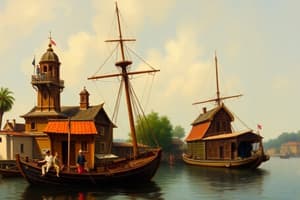Podcast
Questions and Answers
What was a significant characteristic of the treaties signed between Goa and the Deccan sultans in 1570?
What was a significant characteristic of the treaties signed between Goa and the Deccan sultans in 1570?
- They favored the Portuguese over the local sultans.
- They were signed only once and never renewed.
- They were regularly renewed as long as their kingdoms lasted. (correct)
- They were strictly enforced by the Mughals.
Who was the primary authority figure in the Portuguese administration in India?
Who was the primary authority figure in the Portuguese administration in India?
- The captain of the fortresses
- The viceroy (correct)
- The Vedor da Fazenda
- The chief merchant
How did the Portuguese religious policies towards Hindus change over time?
How did the Portuguese religious policies towards Hindus change over time?
- The introduction of the Inquisition led to increased persecution of Hindus. (correct)
- They remained consistently tolerant throughout.
- They became solely focused on converting the Mughal emperor Akbar.
- They initially targeted only local Muslims for conversion.
What role did the Portuguese play in the balance of power between Indian kingdoms?
What role did the Portuguese play in the balance of power between Indian kingdoms?
What was a notable aspect of the Jesuit missions to India under Akbar?
What was a notable aspect of the Jesuit missions to India under Akbar?
What was a key aspect of the Portuguese maritime strategy in East Africa and India?
What was a key aspect of the Portuguese maritime strategy in East Africa and India?
Which event marked a significant treaty between the Portuguese and an Indian kingdom?
Which event marked a significant treaty between the Portuguese and an Indian kingdom?
Which religious policy was notably implemented during Albuquerque's rule in India?
Which religious policy was notably implemented during Albuquerque's rule in India?
How did Portuguese colonization affect trade in India?
How did Portuguese colonization affect trade in India?
What was a significant administrative change in Goa after Nino da Cunha took office?
What was a significant administrative change in Goa after Nino da Cunha took office?
Flashcards are hidden until you start studying
Study Notes
Treaties and Power Dynamics
- Treaties signed in 1570 between Goa and the Deccan sultans were renewed regularly until the kingdoms fell.
- Portuguese involvement was crucial in battles for power among Vijayanagara, Deccan sultans, Mughals, and Marathas.
- The Portuguese were the initial European presence in India and remained until 1961 when Goa was recaptured by India.
Portuguese Administration
- The viceroy led the administration in India for a three-year term, supported by a secretary and later a council.
- The Vedor da Fazenda managed revenue and shipping logistics.
- Fortresses from Africa to China were overseen by captains with significant autonomy, often for personal benefit.
Religious Policy
- Portuguese hostility towards Muslims stemmed from their conflicts in North Africa.
- Initially tolerant towards Hindus, persecution increased following the introduction of the Inquisition in Goa.
- Jesuits impressed Mughal emperor Akbar, who sought two learned priests in 1579, but conversion efforts ultimately failed.
Expansion and Control
- Portuguese established strongholds in East Africa and Indian Ocean regions, controlling trade routes.
- Albuquerque acquired Goa in 1510, marking the first European territorial gain in India since Alexander the Great.
- His rule featured the abolition of sati, but also led to significant persecution of Muslims.
Settlement and Cultural Impact
- Portuguese men encouraged to marry local women led to a mixed population in Goa.
- Settlements included artisans, traders, and landlords who introduced new agricultural practices and crops.
Key Figures and Events
- Nino da Cunha shifted the Portuguese government headquarters from Cochin to Goa in 1530.
- Bahadur Shah of Gujarat ceded Bassein to the Portuguese in 1534 for military support but later relations soured.
Decline of Portuguese Power
- Significant milestones in Portuguese history include:
- 1498: Vasco-da-Gama’s arrival at Calicut.
- 1503: First Portuguese fort established at Cochin.
- 1510: Capture of Goa by Albuquerque.
- 1535: Subjugation of Diu.
- 1612: Loss of Surat to the English.
- 1663: Dutch capture of all Portuguese forts on the Malabar Coast.
- The spice trade shifted to Dutch control, and Goa's importance diminished post-Vijayanagara empire collapse.
Impact of Portuguese Presence
- Portuguese arrival marked the start of the European era and the emergence of naval power in India.
- The introduction of cannon on ships allowed for monopoly over trade with military force.
- The 16th-century Malabar showcased Portuguese military innovations, influencing local tactics and technologies.
Studying That Suits You
Use AI to generate personalized quizzes and flashcards to suit your learning preferences.




